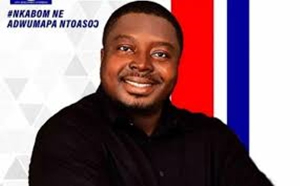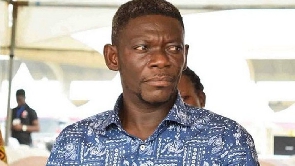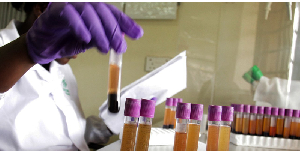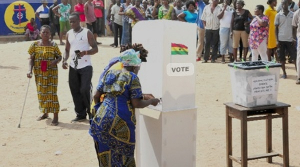- Home - Sports
- Soccer Portal
- Archived Sports News
- Sports Videos | TV
- Year In Review
- Sports Photos
- Sports Headlines
- Boxing
- Athletics
- Basketball
- Bodybuilding
- Cricket
- Golf
- Handball
- Hockey
- Martial Arts
- Tennis
- Volleyball
- Other Sports

General News of Saturday, 25 October 2003
Source: United States Department of State (Washington, DC)
U.S. Judges Train Ghanaian Judiciary Despite Lack of Infrastructure
When Judges Ann Williams, Ted McKee, and Vicki Miles-LaGrange met with members of the Ghanaian judiciary earlier this month on a trip sponsored by the U.S. State Department, they knew a long-term plan needed to be developed to help reshape a budding judiciary that has been riddled by corruption in the past.
"We knew that if we didn't have a five-to-seven year plan, that just coming over whenever we have the money wouldn't be enough," said Williams of the Seventh Circuit Court of Appeals in Chicago. "If you want to get serious, you need a plan. We said we'd even draft an initial plan if that would help them."
The trip combined training members of the Ghanaian judiciary in ethics, alternative dispute resolution, research and writing, and court administration, while helping the American judges get a feel for what exactly the judicial system in Ghana needs to function properly. On the top of their list, said Williams, was the construction of a new judicial training center.
"Their vision is to have the training center available to other countries in the West Africa region," said Peggy Ochandarena, a United States Agency for International Development Fellow who accompanied the judges on the trip. "They would like to make it a prototype, and since Ghana is a stable country in a relatively unstable region, it makes sense."
During the training sessions, which were held in cramped courtrooms without adequate audiovisual equipment or enough space, Williams explained that she could not properly conduct her session because there was only one overhead projector and it was already being used elsewhere.
"There are really only two rooms, they (the judiciary) can use for training right now," said Williams. "A retired judge in Ghana has given them a large building on beautiful property, but it needs $300,000 for renovations."
Previously, the American Bar Association Africa Bureau Director Vernice Guthrie had worked with The World Bank to acquire funding for this and other projects to help reform the Ghanaian judiciary, but due to several factors the money has "dried up" according to Guthrie, and plans like the one for the training center will be on hold until more money is secured.
"There have been lots of assessments done in Ghana, but they have all been internal. The World Bank and the ABA made funds available for a Judicial Reform Index Assessment (an independent appraisal of the courts, personnel, infrastructure, and materials within the judiciary), but the former Chief Justice in Ghana would not sign off on this because he said there have already been numerous assessments," explained Guthrie. "The problem is that these assessments" do not meet the criteria of The World Bank, and as a result, "the funding has dried up."
Guthrie went on to explain that The World Bank encourages the use of outside, independent auditors for such assessments so that the results are not "owned" by any members of an interested party. This independent assessment can more accurately reflect both the positive and negative aspects of the judiciary and point out things than can be changed.
Williams said that she and McKee and Miles-LaGrange were all willing to explain the necessity of an independent review to the Chief Justice in Ghana, so that plans for the training center, as well as for a computer system upgrade, stenograph machines, and CD-ROMs to keep track of opinions will not fall by the wayside.
"I'd like to thank the State Department for making this trip possible," said Williams. "They put it together and they made it happen. I think we were really responsive to the needs of the Ghanaians."
(The Washington File is a product of the Bureau of International Information Programs, U.S. Department of State. Web site: http://usinfo.state.gov)










